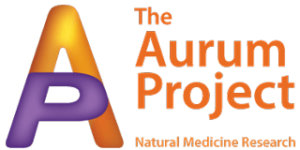Globally there is an increase in the prevalence of children on the autism spectrum. This is pushing a call for more autism research studies. The fairly standard therapies available worldwide include speech therapy, sensory integration, occupational therapy and special education. Individualised sessions are offered by speech therapists for communication difficulties, occupational therapists for sensory issues and special educators for learning or behaviour issues.
In spite of special schools where these programs and sessions are available, parents and therapists find that certain sensory issues, behaviour issues and other difficulties still continue. It is in these situations that parents approach homeopathic practitioners. Consequently, there is an increase in autism research and treatment using homeopathy.
Several carefully written reports of case studies have highlighted the use of homeopathy in research in autism spectrum disorders. The homeopathic case taking covers all aspects of the child’s physical, emotional and intellectual dimensions.
2016 A report of six cases using homeopathy treatment for autism in India by Dr Rajalakshmi
Dr Rajalakshmi worked as an independent practitioner and consultant to a special school. From this experience she said "I have had the opportunity to see children with autism from mild to severe. In the special schools I have observed children who were on homeopathic treatment and also children at the same level who were not on homeopathic treatment. I found that the children who were not on treatment were still grappling with the same issues when I first saw them whereas there were significant improvements in social interaction, eye contact, reduction in hyperactivity, reduced temper tantrums and better communication skills in the children who were on homeopathic treatment. Therefore it would be a good option to use homeopathy as part of a treatment protocol simultaneously as an adjunct to neuropsychological therapies for enhanced results."
Dr Rajalakshmi reports that homeopathic remedies have helped calm head banging and hand flapping. Meaningless speech was converted to meaningful speech.
2013 - Four autism case studies in India
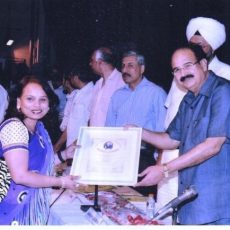
Dr Neeraj Gupta receiving an award for her autism research
The homeopath Dr Neeraj Gupta published a paper about four cases of autistic children. They received on-going homeopathic treatment.
A conclusion from this study was that a homeopathic medicinal regimen does produce modification of autistic symptoms, if followed dutifully.
2011 - A clinical study of ten case studies of autistic children using homeopathy in India
A clinical study evaluated the efficacy of homeopathic medicines in 10 autistic children. The author again is Dr Neeraj Gupta.
Improvement in common autism symptoms:
- Significant improvement in immunity level
- Significant decrease in hyperactivity and restlessness
- Moderate to mild improvement in obeying commands, eye contact and judgment
- Could not obtain desired improvement in sensory problems and communication skills
Improvement in individual children's autistic symptoms:
- Improvement in self rocking, violent anger spells, poor attention, random laughing, disturbed sleep pattern, self biting, eating of wall materials, control of urination & defecation and communication skills
- Mild to moderate improvement in other specific symptoms
- Not much improvement could be observed in cases of regurgitation of food, making loud noises and certain other specific behavioural autistic activities.
Both constitutional and intercurrent homeopathic regimens were used. They observed that homeopathy can be more effective for the treatment of autistic children, if they are diagnosed at early stages of development. No improvement or partial improvement was found in three children who were also suffering from another condition such as a parasitic infestation.
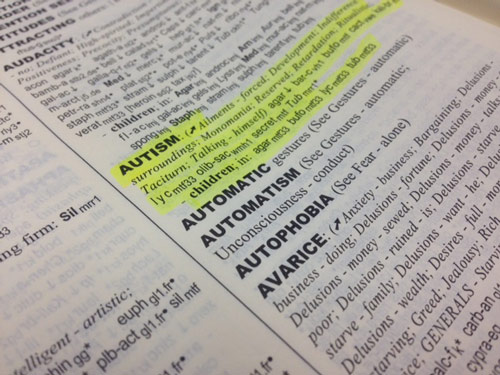
2010 Homeopathic medicinal treatment of autism published in the Indian Journal of Research in Homoeopathy
This study by Dr Neeraj Gupta included 25 children on the spectrum. Their age ranged from 4 to 14 years and included both sexes. Children were included who were diagnosed with or without other problems such as parasitic infections. They received homeopathic remedies and were carefully followed up for 18 months. The children were divided into two groups either moderate or severe, according to the number and severity of symptoms. Improvement was monitored on a weekly basis. Frequent repetition of remedies in some severe conditions was found effective.
-
Improvement of eating and drinking abnormalities
-
Better control of the bowel and bladder especially bedwetting decreased by 80%
-
Immunological and allergic reactions reduced by 70%
-
Less gestures and sensory issues (visual, touch, pain and temperature)
-
Lessening of echolalia
-
Jumping, spinning, hand flapping was decreased by 83%
- Two children who were eating leaves, lipstick, and creams showed complete reversal of the habit
2006 - 2009 Spandan Clinic study with 60 children
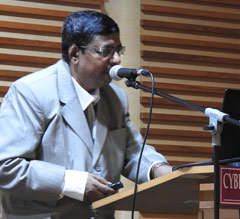
Dr Praful Bravalia from Spandan Clinic has lectured widely about autism research using homeopathy
The 60 children were enrolled from the Spandan Holistic Institute of Applied Homeopathy and from the institute’s mobile clinic. Spandan is one of the largest homeopathy autism research organisations in the world.
This study was a non-randomised, self-controlled, pre and post-intervention study with six months as a self-control period. The diagnosis of autism was made by a team consisting of: homeopathic physician, psychologist, neurologist and psychiatrist. One year was the treatment period.
Homeopathic treatment had a statistically significant impact on the cognitive ability of all autistic children. Homeopathy brought about improvement in behaviour followed by significant changes in other aspects eg, sensory impairment, socialisation and communication. Importantly (because it is not what you would expect) children with dull normal intelligence showed the highest improvement followed by children with mild retardation.
This Indian autism research showed 88.34% of children improved with the response being: mild (16 children), moderate (21 children), or marked (16 children) improvement.
2008 - A pilot study of seven autistic children in Brazil

Analysis of case studies showed the positive effect of homeopathic treatment in the cognitive, motor and behavioural performance of autistic patients. The main author was Geórgia Fonseca.
The results suggested that the longer the use of homeopathy for autism, the more remarkable the improvement. Similarly, the earlier it was started, the better the outcome. On the other hand, even in teenagers, homeopathy positively affected behaviour, with a decrease in aberrant behaviour and better social integration.
2008 - A study of five cases of autism in India
 M.A. Rajalakshmi worked as a consultant for four years in a special school setting and also saw autistic children in private practice. Her contribution to autism research was a paper titled Role of Homoeopathy in the Management of Autism: Study of Effects of Homoeopathic Treatment on the Autism Triad.
M.A. Rajalakshmi worked as a consultant for four years in a special school setting and also saw autistic children in private practice. Her contribution to autism research was a paper titled Role of Homoeopathy in the Management of Autism: Study of Effects of Homoeopathic Treatment on the Autism Triad.
The paper described five children with a confirmed diagnosis of Autism or Pervasive Developmental Disorder, Not Otherwise Specified (PDD-NOS). Three were high functioning with mild to major issues with communication or even non-verbal. Two of the children were low-functioning with mental retardation and non-verbal.
A summary of overall results seen after Homeopathic treatment:
- Reduction in hyperactivity
- Improvement in sitting tolerance/attention span
- Improvement in sensory perceptual skills
- Better & appropriate expression of emotions
- Improvement in both fine motor & gross motor abilities
- Improvement in social skills/eye contact
- Improvement in speech, language & communication skills
- Reduction in anxiety states/temper tantrums
- Better sleep patterns
2008 - Six case studies using homeopathy for autism in India
Again Rajalakshmi published a paper this time with the title of New Dimensions in the Treatment of Autism with Homeopathy. Using this study and drawing on the conclusions of the other study it was found that there were significant uses for homeopathy in the management of autism. Of the 6 children, three were verbal and three were non-verbal. Two of the children had associated mental retardation. Different potencies of homeopathic remedies from 30c to 200c and in some cases 1M was used.
Some parents made an interesting observation. They noticed that certain special abilities (savant skills) seemed to disappear once the child started to speak. Sometimes this was when there was overall improvement in another skill area. One parent said that her son used to be able to hear the sound of his father’s scooter when he was quite a distance away. The child would be at the gate waiting for his dad, whereas the mother was not able to hear the sound. Later when his speech and communication improved he was no longer able to do this.
Rajalakshmi says "There is a lot of awareness about homeopathy and also its effectiveness in treating autism. However there are a few things that have to be kept in mind before starting homeopathic treatment. It is impossible to generalise the treatment as in allopathic medicine. Homeopathy is highly individualised and one has to find a homeopath who uses this approach to treat the child. Also the homeopath should have some amount of exposure and experience in dealing with children with autism."
2003 Spandan Clinic research in India
From 1998 to 2003 the Spandan Clinic conducted research using of 54 case studies. In this study, 72% of cases who continued homeopathy for autism for more than six months showed significant improvement in the following order:
- Hyperactive behavior like restlessness and tantrums
- Impaired sensory defences
- Eye contact
- Speech.
60% of cases with autism regained speech.
50% of cases (without significant retardation), who continued for more than two years were rehabilitated in mainstream school or slow learners class while others were enrolled in Special School.
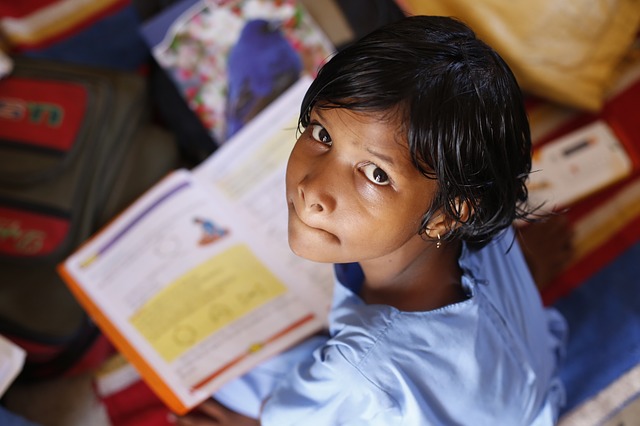
There are some important new conclusions from autism research using case studies:
- If children are diagnosed early and start homeopathy early then homeopathy can be more effective
- On the other hand, even in teenagers, homeopathic treatment may positively affect behaviour. There is a decrease in aberrant behaviour and better social integration
- Homeopathy generally may bring about improvement in the area of behaviour and sensory impairment quite early during the course of treatment. Though one study found that they could not obtain the desired results in sensory problems and communication skills
- Children with dull normal intelligence showed the highest improvement in research, followed by children with mild retardation
- Obsessiveness takes longer to be addressed than hyperactivity
- For an effective outcome, frequent repetition of remedies in some conditions may be needed
- The longer the child is given homeopathy the better the outcome
- However, occasionally the response may be faster. You can read about a case of homeopathy autism recovery by clicking here.
- One study found that not much improvement could be observed in specific cases of regurgitation of food,. Nor in making loud noises and certain specific autistic behavioural activities
- In one study, no improvement or partial improvement was found where another condition was present such as a parasitic infestation
- Many different styles of homeopathy for autism may be effective
- Around the world researchers, parents and practitioners are calling for more autism research and natural autism treatment
If you know of other published autism research with a case studies analysis of homeopathic treatment please let us know through our contact page.
Since you're here...
…. We have a small favour to ask you. More people than ever before are reading the Aurum Project blog. There is a surge of interest in natural therapies research. But grants or support from funding bodies is hard to come by. So you can see why we would like to ask for your help. The Aurum Project is an Australian independent research group with charity status. Our research takes a lot of time, money and hard work to keep pushing forward. But we love it because we believe our work is important and we’ve been told by parents over and over again that they believe what we do is important too. For as little as $5 per month you can help support our work. All donations are tax deductible. It will only take a minute. Thank you. Click here to donate today.
